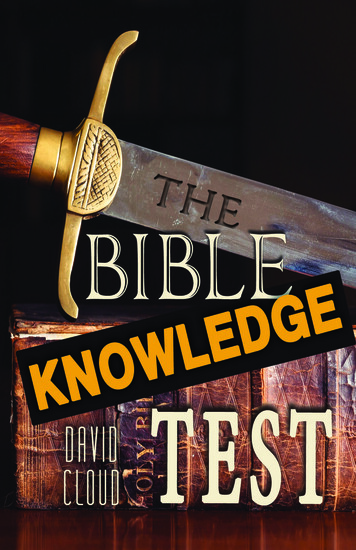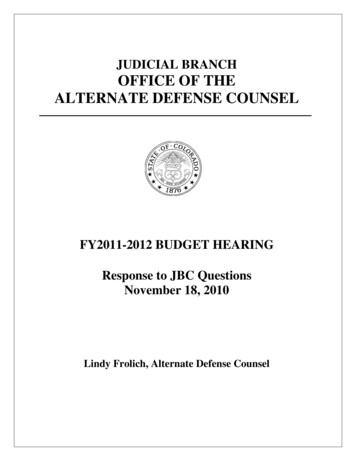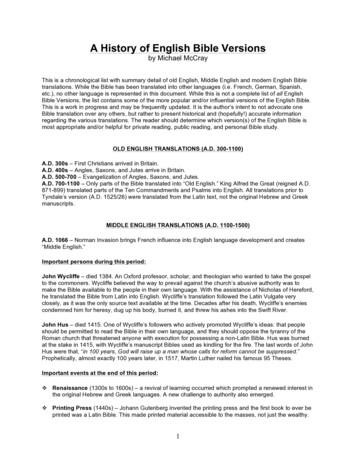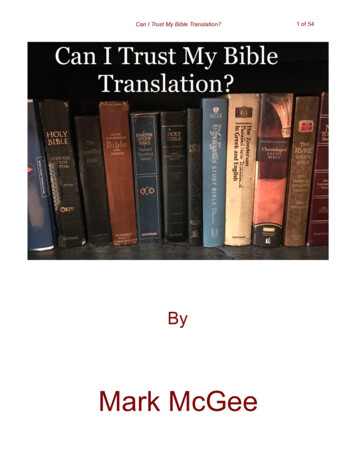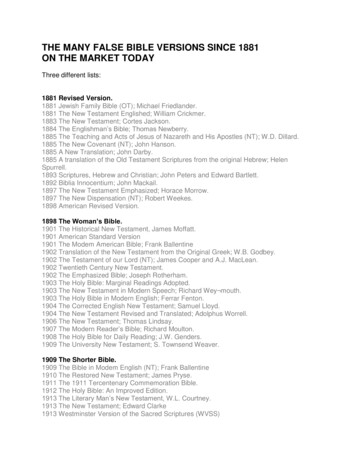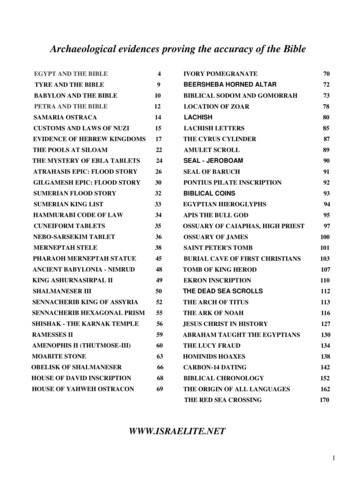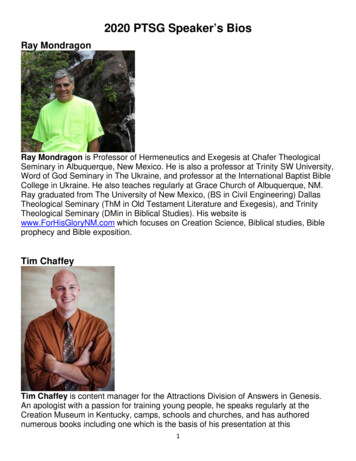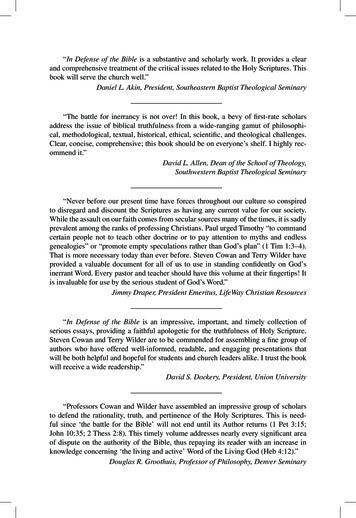
Transcription
“In Defense of the Bible is a substantive and scholarly work. It provides a clearand comprehensive treatment of the critical issues related to the Holy Scriptures. Thisbook will serve the church well.”Daniel L. Akin, President, Southeastern Baptist Theological Seminary“The battle for inerrancy is not over! In this book, a bevy of first-rate scholarsaddress the issue of biblical truthfulness from a wide-ranging gamut of philosophical, methodological, textual, historical, ethical, scientific, and theological challenges.Clear, concise, comprehensive; this book should be on everyone’s shelf. I highly recommend it.”David L. Allen, Dean of the School of Theology,Southwestern Baptist Theological Seminary“Never before our present time have forces throughout our culture so conspiredto disregard and discount the Scriptures as having any current value for our society.While the assault on our faith comes from secular sources many of the times, it is sadlyprevalent among the ranks of professing Christians. Paul urged Timothy “to commandcertain people not to teach other doctrine or to pay attention to myths and endlessgenealogies” or “promote empty speculations rather than God’s plan” (1 Tim 1:3–4).That is more necessary today than ever before. Steven Cowan and Terry Wilder haveprovided a valuable document for all of us to use in standing confidently on God’sinerrant Word. Every pastor and teacher should have this volume at their fingertips! Itis invaluable for use by the serious student of God’s Word.”Jimmy Draper, President Emeritus, LifeWay Christian Resources“In Defense of the Bible is an impressive, important, and timely collection ofserious essays, providing a faithful apologetic for the truthfulness of Holy Scripture.Steven Cowan and Terry Wilder are to be commended for assembling a fine group ofauthors who have offered well-informed, readable, and engaging presentations thatwill be both helpful and hopeful for students and church leaders alike. I trust the bookwill receive a wide readership.”David S. Dockery, President, Union University“Professors Cowan and Wilder have assembled an impressive group of scholarsto defend the rationality, truth, and pertinence of the Holy Scriptures. This is needful since ‘the battle for the Bible’ will not end until its Author returns (1 Pet 3:15;John 10:35; 2 Thess 2:8). This timely volume addresses nearly every significant areaof dispute on the authority of the Bible, thus repaying its reader with an increase inknowledge concerning ‘the living and active’ Word of the Living God (Heb 4:12).”Douglas R. Groothuis, Professor of Philosophy, Denver Seminary
“The assault parameters on the veracity of Scripture have changed direction oflate, often emphasizing textual corruption and editorial changes. Entering the frayis this excellent volume edited by Steve Cowan and Terry Wilder. Divided into threeparts with seventeen chapters, written by major, well-accomplished authors, this textfollows an orderly progression through the relevant topics. Further, this book featuresa wide array of strong arguments, fascinating details, and fresh, valuable insights notoften found elsewhere. Altogether, it comprises an assortment of responses for thosewho wonder how these recent challenges may be addressed. I strongly recommendthis volume, especially as a textbook that presents an updated rejoinder to the recentassertions.”Gary R. Habermas, Distinguished ResearchProfessor & Chair, Department of Philosophy,Liberty University and Theological Seminary“Cowan and Wilder have amassed a stellar team of contributors who produce abook that is at once deep in coverage and wide in scope. This is an authoritative treatment of biblical inspiration and inerrancy, and I highly recommend it.”J. P. Moreland, Distinguished Professor of Philosophy,Talbot School of Theology, Biola University“In Defense of the Bible is much more than an apologetic for the authorityof Scripture, as important as such an undertaking always is. This important volumeexplains, for skeptics and believers alike, why the Bible can and indeed should beaccepted as the Word of God on which fallible human beings can rely for informationabout God and the world, sin and salvation, truth and error, and about how we shouldlive. Readers will learn much about the viability of the historic Christian position thatthe Bible is the true and inerrant Word of God. And they will be competently introduced into a wide variety of areas, including philosophy, logic, linguistics, exegetical methodology, the history of interpretation, Israel’s conquest of the promised land,Jesus’ miracles, the narratives of Jesus’ resurrection, ethics, slavery, gender relations,science, biblical manuscripts, the canon of the Old and New Testament. Carefullyargued, meticulously documented, and lucidly and creatively written, In Defense ofthe Bible should be read by every pastor and student, believer and skeptic, who isconcerned about truth—the truth about God, the truth about the Bible, and the truthabout ourselves.”Eckhard J. Schnabel, Mary F. Rockefeller Distinguished Professorof New Testament Studies, Gordon-Conwell Theological Seminary
[Title Page]IN DEFENSE OF THE BIBLEA Comprehensive Apologetic for theAuthority of Scripture
In Defense of the Bible: A Comprehensive Apologetic for the Authority of ScriptureCopyright 2013 Steven B. Cowan and Terry L. WilderBroadman & Holman Publishing GroupNashville, TennesseeAll rights reservedISBN: 978-1-4336-7678-9Dewey Decimal Classification: 239Subject Heading: CHRISTIANITY—APOLOGETIC WORKS \ APOLOGETICS \ BIBLEUnless otherwise noted, Scripture quotations are taken from the Holman Christian StandardBible Copyright 1999, 2000, 2002, 2003, 2009 by Holman Bible Publishers. Used bypermission.Scripture quotations marked ESV are from The Holy Bible, English Standard Version, copyright 2001 by Crossway Bibles, a division of Good News Publishers. Used by permission.All rights reserved.Scripture citations marked NASB are from the New American Standard Bible. The LockmanFoundation, 1960, 1962, 1968, 1971, 1973, 1975, 1977, 1995. Used by permission.Scripture citations marked NIV are from the HOLY BIBLE, NEW INTERNATIONAL VERSION . Copyright 1973, 1978, 1984 by International Bible Society. Used by permission ofZondervan Publishing House. All Rights Reserved.Scripture citations marked NKJV are from The New King James Version, copyright 1979,1980, 1982, Thomas Nelson, Inc., Publishers.Scripture quotations marked NLT are taken from the Holy Bible, New Living Translation,copyright 1996. Used by permission of Tyndale House Publishers, Inc., Wheaton, Illinois60189. All rights reserved.Scripture citations marked NRSV are from the New Revised Standard Version of the Bible,copyright 1989 by the Division of Christian Education of the National Council of Churchesof Christ in the United States of America. Used by permission. All rights reserved.Scripture citations marked RSV are from the Revised Standard Version of the Bible copyright1946, 1952, 1971, 1973 by the National Council of the Churches of Christ in the U.S.A. andused by permission.Printed in the United States of America r VP
Dear friends, although I was eager to write you about ourcommon salvation, I found it necessary to write and exhort you tocontend for the faith that was delivered to the saints once for all.(Jude 3)To Paige Patterson and Paul Pressler,contenders for the faith.Untold numbers of Christians are forever in your debt.
teven B. Cowan and Terry L. WilderPart OnePhilosophical andMethodological ChallengesChapter OneCan and Would God Speak to Us? A Dialogue on DivineSpeaking13R. Douglas GeivettChapter TwoWhat Does It Mean to Say that the Bible Is True?47Douglas K. BlountChapter ThreeHigher Criticism: What Has It Shown?63Charles L. QuarlesChapter FourCan We Understand the Bible?89Richard R. Melick Jr.Part TwoTextual and Historical ChallengesChapter FiveHas the Old Testament Text Been Hopelessly Corrupted?Paul D. Wegnervii119
viiiIn Defense of the BibleChapter SixHas the New Testament Text Been Hopelessly Corrupted?139Daniel B. WallaceChapter SevenDoes the Bible Contain Forgeries?165Terry L. WilderChapter EightIs the Story of Jesus Borrowed from Pagan Myths?183Mary Jo SharpChapter NineIs the Old Testament Historically Reliable?201Walter C. Kaiser Jr.Chapter TenIs the New Testament Historically Reliable?223Paul W. BarnettChapter ElevenAre There Contradictions in the Bible?267Douglas S. HuffmanPart ThreeEthical, Scientific, andTheological ChallengesChapter TwelveDoes the Bible Condone Genocide?297Matthew Flannagan and Paul CopanChapter ThirteenDoes the Bible Condone Slavery andSexism?335James M. Hamilton
ContentsixChapter FourteenDoes the Bible Conflict with Science?349William A. DembskiChapter FifteenAre There Conflicting Theologies in the Bible?375Craig A. BlaisingChapter SixteenDo We Have the Right Canon?393Paul D. Wegner, Terry L. Wilder, and Darrell L. BockChapter SeventeenIs the Bible the Word of God?429Steven B. CowanName IndexSubject IndexScripture Index465474477
Chapter SeventeenIs the Bible the Word of God?Steven B. CowanMost of the articles in this volume have addressed variousquestions related to the Bible’s accuracy and truthfulness. This is all well and good. But one question remains.Christians throughout the centuries have claimed much more forScripture than that it is historically reliable, consistent, and truthful. We have claimed that the Bible is the Word of God. That is, webelieve that God is the (ultimate) author of the sixty-six books ofthe Protestant canon. Despite the real authorial input of the humanwriters, the very words () of the biblical autographs find theirorigin in the mind of God (2 Tim 3:16). As Peter put it, “[M]ovedby the Holy Spirit, . . . [they] spoke from God” (2 Pet 1:21 NLT). Inways that may be difficult or impossible to explain (and we will notattempt to explain it here), God worked providentially in the lives ofthe human authors, and sometimes spoke directly to them, so that thewords they wrote were his words. This is what Christians mean whenthey say that the Bible is divinely inspired.How can this faith in the divine inspiration of Scripture be justified? That is the question we seek to answer in this article. Afterdiscussing briefly various approaches to answering this question, Iwill present and defend what I take to be the strongest argument forthe Bible’s divine inspiration, an argument based on the authoritativetestimony of Jesus, the Son of God.Before beginning this discussion, however, I want to point outthree assumptions that my argument will make. First, I will assumethat God exists. This assumption entails that the universe and all that isin it are the creation ex nihilo of a transcendent, self-existent, omnipotent, omniscient, omnipresent, and omnibenevolent Person. ThoughI will not defend this assumption here, it should be known that it isnot an arbitrary or unreasonable one. There is ample evidence for the429
430Steven B. Cowanexistence of God.1 It is not a matter of blind faith but is eminentlyrational. For what it’s worth, the Bible presents God’s existence asa matter of knowledge (cf. Rom 1:18–20; Ps 19:1–6), and the vastmajority of people in the history of the world (including today) findbelief in a transcendent, personal God unproblematic.Second, I will assume that God can intervene in the courseof history to perform miracles which can be identified as such byhuman beings. A miracle may be simply defined as an event thatis so unusual and contrary to the ordinary course of nature that thecausal activity of God is the best explanation for the event. Modernskepticism toward the miraculous is rooted in metaphysical and/ormethodological naturalism. The former is a philosophy that deniesthe reality of anything beyond the realm of nature and what can bestudied by the scientific method. Accordingly, miracles, understoodas acts of God, are rejected as impossible. But if God exists, metaphysical naturalism is false and miracles cannot be said to be strictlyimpossible. Methodological naturalism is the view that science andhistory may only appeal to natural causes in scientific and historicalexplanations. If a scholar invokes a supernatural cause to explainsome natural phenomenon, then according to methodological naturalism he is no longer doing science or history but theology. Methodological naturalism, like atheism/agnosticism, is unjustified. If Godcauses a miraculous event to occur in space and time, and that eventleaves empirical and historical traces (e.g., eyewitness testimony orphysical changes in the world), there is no good reason why thatevent cannot be the subject of scientific and historical study; no reason why the scientist or historian, qua scientist and qua historian,cannot investigate that event and seek to discern its cause. And noreason, in principle, why a scientist or historian cannot conclude thatthe event has a supernatural cause. The view to the contrary assumesthat God is not capable of leaving sufficient evidence—his “footprints” if you will—of his intervention in history.21For detailed evidence for God’s existence, see Paul Copan and Paul K. Moser, eds., TheRationality of Theism (New York: Routledge, 2003); James F. Sennett and Douglas Groothuis,In Defense of Natural Theology: A Post-Humean Assessment (Downers Grove, IL: InterVarsity,2005); William Lane Craig, Reasonable Faith: Christian Truth and Apologetics, 3rd ed.(Wheaton, IL: Crossway, 2008), 93–204; J. P. Moreland, Consciousness and the Existence ofGod: A Theistic Argument (New York: Routledge, 2008); R. Scott Smith, Naturalism and OurKnowledge of Reality: Testing Religious Truth-Claims (Surrey, UK: Ashgate, 2012); Stephen T.Davis, God, Reason, and Theistic Proofs (Grand Rapids: Eerdmans, 1997).2For thorough responses to methodological naturalism in both science and history, aswell as responses to objections to miracles, the following sources may be consulted: Steven B.Cowan, “But Is It Science?” Areopagus Journal 5, no. 1 (2005): 22–26; Alvin Plantinga, “Should
Is the Bible the Word of God?431My third and final assumption is that God is able to communicate verbally with human beings. That is, God has the ability toreveal propositional truths to us about himself, about us, and aboutthe world. We reject the notion that God is so totally other as to beineffable and any “revelation” of himself so vague as to be unintelligible. As Doug Geivett has defended this assumption elsewhere inthis volume,3 I will not belabor the point here. Suffice it to say thatthis assumption implies that there is no obstacle to God inspiring awritten revelation as the Bible purports and as Christians claim it tobe. All that remains is to explain how we would recognize such arevelation should it occur.The Question of MethodHow can we tell if the Bible is divinely inspired—as opposedto some other putatively revealed book such as the Qur’an? Let’sdivide the answers that Christians have given into two broad familiesof views.4Methodological Naturalism Constrain Science?” in Science: Christian Perspectives for theNew Millennium, ed. Scott B. Luley, Paul Copan, and Stan W. Wallace (Norcross, GA: RZIM,2003), 107–34; idem, Where the Conflict Really Lies: Science, Religion, and Naturalism (NewYork: Oxford University Press, 2011); J. P. Moreland, “Theistic Science and MethodologicalNaturalism,” in The Creation Hypothesis: Scientific Evidence for an Intelligent Designer(Downers Grove, IL: InterVarsity, 1994), 41–66; idem, Christianity and the Nature of Science:A Philosophical Investigation (Grand Rapids: Baker, 1989), esp. 213–46; William A. Dembski,Intelligent Design: The Bridge Between Science and Theology (Downers Grove, IL: InterVarsity,1999), 49–69, 252–60; idem, “Does the Bible Conflict with Science?” in this book (p. 349); CraigL. Blomberg, The Historical Reliability of the Gospels, 2nd ed. (Downers Grove, IL: InterVarsity,2007), 104–51; Michael R. Licona, The Resurrection of Jesus: A New HistoriographicalApproach (Downers Grove, IL: InterVarsity, 2010), 133–98; Norman L. Geisler, Miracles andthe Modern Mind (Grand Rapids: Baker, 1992), 75–82; C. Stephen Evans, The Historical Christand the Jesus of Faith: The Incarnational Narrative as History (Oxford: Clarendon, 1996),137–202; Richard Swinburne, The Concept of Miracle (New York: Macmillan, 1970); idem, TheResurrection of God Incarnate (New York: Oxford University Press, 2003), 17–26; Stephen T.Davis, Risen Indeed: Making Sense of the Resurrection (Grand Rapids: Eerdmans, 1993), 1–42;R. Douglas Geivett and Gary R. Habermas, eds., In Defense of Miracles: A Comprehensive Casefor God’s Action in History (Downers Grove, IL: InterVarsity, 1997); Craig S. Keener, Miracles:The Credibility of the New Testament Accounts, 2 vols. (Grand Rapids: Baker, 2011); Francis J.Beckwith, “Theism, Miracles, and the Modern Mind,” in The Rationality of Theism, 221–36;Winfried Corduan, “Miracles,” in To Everyone an Answer, ed. Francis J. Beckwith, WilliamLane Craig, and J. P. Moreland (Downers Grove, IL: InterVarsity, 2004), 160–79; Paul RhodesEddy and Gregory A. Boyd, The Jesus Legend: The Case for the Historical Reliability of theSynoptic Jesus Tradition (Grand Rapids: Baker, 2007), 39–90; The New Dictionary of ChristianApologetics, ed. W. C. Campbell-Jack and Gavin McGrath (Downers Grove, IL: InterVarsity,2006), s.v. “Miracles in Scripture” by P. G. Bolt; The Encyclopedia of Christian Civilization, ed.George T. Kurian (Malden, MA: Wiley-Blackwell, 2012), s.v. “miracles” by Steven B. Cowan.3R. Douglas Geivett, “Can and Would God Speak to Us?” (p. 13).4Much of the remainder of this paper appeared in an abbreviated form in Steven B. Cowan,“How to Make a Case for the Inspiration of Scripture in the Current Milieu,” Journal of theInternational Society of Christian Apologetics 2, no. 1 (2009): 65–85.
432Steven B. CowanNon-EvidentialismFirst, there is the non-evidentialist family. Those in this familyeschew or minimize objective arguments and evidences for the divineinspiration of the Bible. The most popular non-evidentialist viewamong evangelicals is presuppositionalism, defended by CorneliusVan Til, Greg Bahnsen, John Frame, and others.5 According to thethe presuppositionalist, the truth and authority of Scripture mustbe presupposed. To argue rationally for the authority of Scriptureis to appeal to an authority (i.e., human reason) that is inferior tothat of Scripture which, for the Christian, is the highest authority.Rather than let human reason judge the authority of Scripture, thepresuppositionalist insists that Scripture should judge human reason.6While no Christian wants to diminish the authority of Scriptureor elevate finite, fallen human reason over the Bible, I do believethat presuppositionalism is guilty of confusing ontology and epistemology (i.e., the order of being versus the order of knowing). Ofcourse, on the Christian worldview, the Bible is (order of being) thehighest authority—because it is authored by he who has the highestauthority, namely, God. But this does not tell us how we finite humanbeings are to recognize (order of knowing) the Bible as God’s Wordand distinguish it from other claimants to that title. What if a genuineseeker after God (call him Sam) wants to know if God has revealedhimself in writing. But he is confronted by two different persons, aChristian and a Muslim, who claim that the Bible and the Qur’anare, respectively, the true Word of God. How is Sam to decide whichclaim is correct? It won’t help for the Christian to say that Sam mustsimply presuppose the authority of the Bible or else subject the Bibleto the judgment of a lesser authority. This problem is especially acutegiven the fact that the Muslim can tell Sam the very same thing!Consider the following analogy. Jack Bauer is a governmentagent who gets his orders directly from the president of the United5See Cornelius Van Til, The Defense of the Faith (Phillipsburg, NJ: P&R, 1955); idem,Christian Apologetics (Phillipsburg, NJ: P&R, 1976); Greg Bahnsen, Always Ready:Directions for Defending the Faith, ed. Robert R. Booth (Atlanta: American Vision, 1996);John Frame, Apologetics to the Glory of God: An Introduction (Phillipsburg, NJ: P&R, 1994);“Presuppositional Apologetics,” in Five Views on Apologetics, ed. Steven B. Cowan (GrandRapids: Zondervan, 2000), 208–31, 350–63; K. Scott Oliphint, The Battle Belongs to the Lord:The Power of Scripture for Defending our Faith (Phillipsburg, NJ: P&R, 2003); and WayneGrudem, Systematic Theology: An Introduction to Biblical Doctrine (Grand Rapids: Zondervan,1994), 77–80.6There are other reasons that presuppositionalists give for their view, but this one has alwaysseemed to me to be the most cogent and persuasive. Therefore, I will limit myself to discussingthis one argument.
Is the Bible the Word of God?433States. One day he gets a letter purporting to come from the president that orders him to assassinate enemy agent X. A few minuteslater he gets another letter, allegedly from the president, telling himthat under no circumstances is he to harm enemy agent X. Now it isan ontological fact that the president has authority over Jack. Andit follows from this that the letter that actually came from the president has authority over Jack. But which one? How is Jack to tell?The ontological facts don’t solve Jack’s epistemological problem.It seems that the only solution to this problem is for the president toprovide some kind of objective indices by which Jack can discernthe genuine article from the counterfeit. Likewise, for Sam to knowthat the Bible (and not the Qur’an) is from God, it would seem thatGod must provide him with some objective indices by which he canrecognize the Bible for what it is.The second non-evidentialist view makes some progress inmeeting this requirement. Reformed epistemology suggests that Godoffers compelling indication of the divine inspiration of the Bible bymeans of the internal testimony of the Holy Spirit.7 The idea hereis that a human may have the Holy Spirit impress upon him as hereads the Bible that what he reads is God’s Word. God “speaks tothe person’s heart” as it were, giving him first-person assurance ofthe Bible’s divine authority (or perhaps more precisely, that a portion of Scripture that he’s reading is divine speech directed towardhim). We might imagine that receiving the internal testimony of theSpirit would be analogous to Jack Bauer getting a phone call after hereceived the two letters, and recognizing the voice on the other endas that of the president who says, “Jack, the first letter you receivedis the one I sent. Follow its instructions.”Now it would seem that the Bible itself teaches that there issomething like the internal testimony of the Holy Spirit (Rom 8:16;1 Cor 2:10–16; 1 Thess 2:13; 1 John 4:6; 5:10–11). And severalProtestant confessions of faith describe the internal testimony of theSpirit as the primary means by which Christians can know that theBible is God’s Word.8 So we want to acknowledge the legitimacy of7See Alvin Plantinga, Warranted Christian Belief (New York: Oxford University Press, 2000),241–89, 374–80; Kelly James Clark, “Reformed Epistemology Apologetics,” in Cowan, FiveViews on Apologetics, 266–84; and Evans, The Historical Christ and the Jesus of Faith, 259–82.8For example, the Westminster Confession of Faith asserts in chap. I, sec. V, “We may bemoved and induced by the testimony of the Church to an high and reverent esteem of the HolyScripture. And the heavenliness of the matter, the efficacy of the doctrine, the majesty of thestyle, the consent of all the parts, the scope of the whole (which is, to give all glory to God),the full discovery it makes of the only way of man’s salvation, the many other incomparable
434Steven B. Cowanthis approach. However, the internal testimony works only for theperson who has it. Because of its subjective nature, it has little or noapologetic value for non-recipients. Back to our analogy. SupposeJack Bauer needs to enlist the aid of another person, Chloe, to carryout his assignment. But Chloe, who was not privy to the president’sphone call, would very much like to have some kind of confirmation that the letter that Jack is certifying really is from the president.Barring a direct phone call of her own, she would need some kind ofpublicly accessible evidence of the president’s authorship. Likewise,we might wonder whether or not God has provided some further,public indications of the divine origin of the Bible which would bebeneficial to both Christian and non-Christian.EvidentialismThose who believe that God has in fact provided us with objective, public evidence of the divine inspiration of the Bible belong tothe second family of approaches to our question. Call this the evidentialist family.9 Among its proponents, appeal is made to a widevariety of types of evidences, but speaking generally there are twobroad approaches within this family. The first of these I will call theinherent character approach. According to this approach, the Biblehas within itself certain properties that imply its divine inspiration.10Chief among the properties cited by those who take this approach are(1) the unity of the Bible’s teaching given that it was written by morethan forty individuals over the span of almost two thousand years,(2) the spiritually and morally transforming affect that the Bible hasexcellencies, and the entire perfection thereof, are arguments whereby it does abundantly evidence itself to be the Word of God: yet notwithstanding, our full persuasion and assurance of theinfallible truth and divine authority thereof, is from the inward work of the Holy Spirit bearingwitness by and with the Word in our hearts” (emphasis added).9The term “evidentialism” is used in three distinct ways in apologetic and philosophicalcircles. First, it may refer to a family of apologetic methods that share a similar approach to therelationship between faith and reason, namely, that they are compatible and that reason mayprovide rational support for the truth of the Christian religion in the form of reasons that appealto “common ground” between believers and unbelievers. Secondly, “evidentialism” refers to oneparticular school of apologetics in the family of methods mentioned under the first sense—theschool that stresses the offering primarily of historical evidences for the deity and resurrection ofJesus without a prior philosophical argument for God’s existence. Thirdly, “evidentialism” canrefer to the arch-enemy of Reformed epistemology, namely, the view that it is wrong to acceptany belief without sufficient evidence. In this paper, I am using “evidentialism” in the first senseonly.10For those who take this approach, see Chad Meister, Building Belief: Constructing Faithfrom the Ground Up (Grand Rapids: Baker, 2006); A. W. Pink, The Divine Inspiration of theBible (Authors for Christ, 2007); and James Montgomery Boice, Foundations of the ChristianFaith (Downers Grove, IL: InterVarsity, 1986), 57–66.
Is the Bible the Word of God?435on those who read and study it, and (3) the Bible’s amazing abilityto survive attempts in history to eradicate it. Whether these or otherfactors, the idea is to draw attention to certain characteristics thatthe Bible has that would seem best explained by appeal to divineinspiration.This approach certainly has merit. We might very well expect adivinely inspired book to have such properties. We might expect, forexample, that its message be unified and that it have a life-alteringaffect on readers. We might also expect that God would insure thepreservation of his Word despite attacks against it. However, thisapproach also has significant weaknesses if it is used as the primaryway of arguing for divine inspiration. For one thing, the unity ofthe Bible’s content,11 as remarkable as it is, does not prove that itis divinely inspired. A book, even a large book written by multipleauthors over a long period of time, can have a unified, consistentmessage and not be divinely inspired. I surmise that Tolkien’s TheLord of the Rings trilogy also has thematic unity, but we do notbelieve that Tolkien was divinely inspired. Likewise, the fact that themessage of the Bible has a life-transforming effect does not establishthe inspiration of the Bible unless we are willing to concede thatthe Qur’an, The Lotus Sutra, The Book of Mormon, and Marx’s TheCommunist Manifesto are all inspired as well. People who read thesebooks report life-changing experiences just as dramatic and positiveas those who read the Bible. Again, we would expect that a bookinspired by God would have transforming effects on people, but having such effects is not a sufficient condition for divine inspiration. So,though the inherent character approach is helpful in supporting theChristian belief in the authority and inspiration of the Bible, it wouldbe worthwhile to consider other, perhaps stronger, alternatives.The second, and I think better, evidentialist approach is calledthe Christological approach. It is better because it provides a strongargument that establishes a sufficient condition for inspiration.Essentially, the argument is that we should accept the divine inspiration of the Bible on the authoritative testimony of Jesus. To put itsomewhat simply, we should believe the Bible is inspired becauseJesus said so.This argument is not new. One of the earliest defenders of thisapproach was B. B. Warfield. He wrote, “We believe this doctrine11See the article in this volume by Craig Blaising, “Are There Conflicting Theologies in theBible?” (p. 375), for a defense of the unity of the Bible.
436Steven B. Cowanof the plenary inspiration of the Scriptures primarily because it isthe doctrine of which Christ and his apostles believed, and whichthey
Scripture quotations marked ESV are from The Holy Bible, English Standard Version, copy-right 2001 by Crossway Bibles, a division of Good News Publishers. Used by permission. . Scripture citations marked NRSV are from the New Revised



